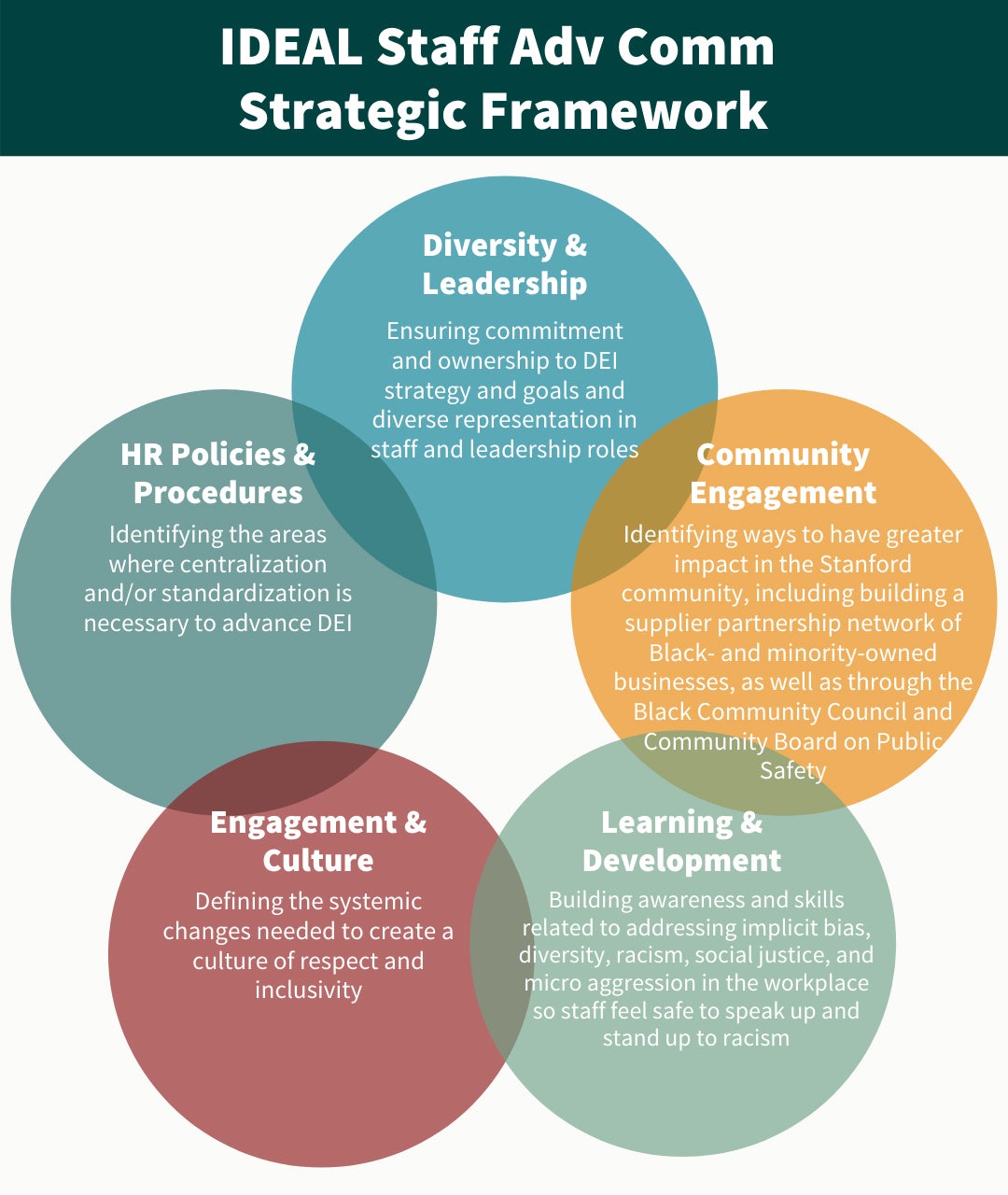Motivated by the racist incidents occurring across the nation over the last year and the light these incidents shone on the racial injustice in our country and in our community, university leadership made a major commitment to advancing racial justice at Stanford and in the broader world. Through the IDEAL initiative (Inclusion, Diversity, Equity and Access in a Learning Environment) that began in 2019, the university is accelerating its efforts to advance a more just society through research and teaching, while at the same time looking at the university itself to make the campus more welcoming, inclusive and safe for all members.
Now, the IDEAL Staff Advisory Committee, a university-wide committee solely focused on advancing the university’s DEI commitments for staff and ensuring the consistent application of DEI strategies for the workforce, has developed a strategic framework to identify a roadmap for transformational change.
The committee is focusing its work on five areas: diversity and leadership, HR policies and procedures, engagement and culture, learning and development and community engagement.
IDEAL Staff Advisory Committee
The IDEAL Staff Advisory Committee was formed and began meeting in fall 2020 to examine the current staff experience related to diversity, equity and inclusion (DEI) and make strategic recommendations for actions.
The cross-school/unit group consists of 21 staff members from across the university and is led by Shirley Everett, senior associate vice provost for Residential & Dining Enterprises and recently named senior advisor to the provost on equity and inclusion; Patrick Dunkley, recently named vice provost for institutional equity, access and community, and Elizabeth Zacharias, vice president for human resources. All seven schools and nine academic and administrative units are represented by committee members and strategic advisors.
View a complete listing of committee members.
“Eliminating racial injustice on our campus, and helping eradicate it in our society, will require a rigorous, comprehensive and sustained effort,” Provost Persis Drell said. “The work of the IDEAL Staff Advisory Committee is a critical step toward advancing equity and inclusivity in Stanford as a workplace and creating concrete, long-lasting culture change in our institution.”
Commitment from university leadership
In February, Drell and President Marc Tessier-Lavigne each met with the IDEAL Staff Advisory Committee to share a strong commitment to ensuring this work is elevated in priority and sustained moving forward and to discuss progress on the university’s racial justice initiatives.
At those meetings, the president and provost also outlined the university’s broader commitment to:
- increasing diversity of leadership and at all levels of the university;
- developing exemplary DEI processes and practices that are implemented with consistency and accountability across the university;
- providing the financial resources necessary to ensure fulfillment of the DEI vision and aspirations.
Tessier-Lavigne shared his views in a recent virtual campus conversation.
“This work [IDEAL] has been underway for some time, but the events of the last year made it clear that we need to act with even greater urgency to tackle both anti-Black racism specifically, and racial injustice in general, both in our community and in our country,” he said.
“I’m especially grateful to the many students, faculty members and staff who’ve come forward to share their personal experiences with racism on our campus. Their testimony has been powerful and deeply moving and their ideas and recommendations about how to advance racial justice have informed our way forward.”
Strategic framework established
Since starting to meet in late fall quarter 2020, the IDEAL Staff Advisory Committee began its work by analyzing workforce data and trends. With those data insights in mind, the committee established a broad strategic framework, which outlines five areas of focus: diversity and leadership, HR policies and procedures, engagement and culture, learning and development and community engagement.
Everett shared her viewpoints about the university’s vision and work of the committee.
“The IDEAL Staff Advisory Committee members and many staff throughout the campus have demonstrated a deep desire to forge transformational culture change. Black Staff and communities of color share the pain and frustration of the palpable, long-standing, and recent expressions of racism, intolerance and hate,” she said. “The Committee is working diligently to create a highly inclusive future where each staff member feels they belong and are valued and respected. I’m honored to be working alongside them as we develop meaningful recommendations for decisive and sustained action.”
Next steps
The next steps to advance the framework established by the committee include:
- Ensuring university leadership is informed of and aligned with the staff DEI strategy and initiatives through a series of meetings and alignment sessions to occur in spring and summer;
- Researching and piloting a comprehensive staff learning journey designed to build awareness of biases and an appreciation of the value of diversity and inclusivity; pilots will start in spring with the intent to offer the learning journey to all staff starting in the fall;
- Gathering data and exploring best practices on ways to enhance current HR processes, ensuring they are inclusive and that they enable all people of color to thrive.
In addition to the steps to advance the strategic framework, the committee is now planning these actions:
- Finalization of the goals, objectives and metrics for all recommendations
- Discussion of the recommendations with university leaders
- Development of project plans for recommendations moving forward
- Launch of the educational initiatives
The IDEAL Staff Advisory Committee can be contacted by emailing idealstaffadvcomm@stanford.edu.
